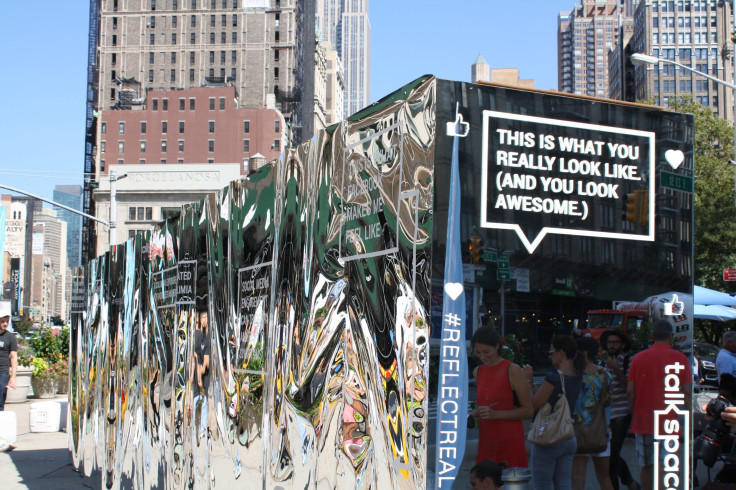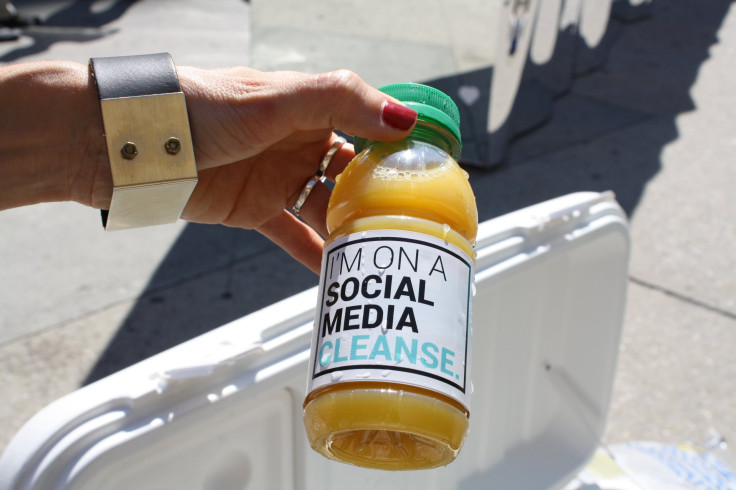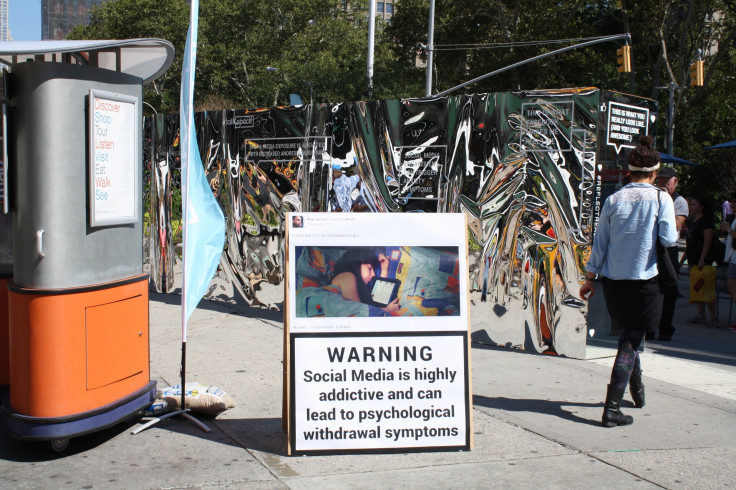The Adverse Effects Of Social Media: Talkspace Brings Attention To How Overuse Can Harm Mental Health

You know when you walk into a carnival fun house and the mirrors make parts of your body thinner, fatter, wider, taller, and just overall funny-looking? A distortion of your reality? That’s how Talkspace sees social media — and it’s how they want you to see it, too. Or at the very least they want you to be aware that what you see on Facebook or Instagram is nothing more than an illusion.
So, last week the online therapy installed a 30-foot fun house mirror in the middle of Flatiron Plaza in New York City to encourage passersby to #ReflectReality and see how social media can distort their self-perception and just about everything around them. The mirror coincides with the launch of a brand new product the site has launched, called social media dependency therapy. It’s a 12-week program that aims to address the range of mental health issues that can result from overconsumption, and how to combat them.

Users interested in this, or any therapy available through Talkspace start by having a free consultation with a matching agent. Users tell the agent about their issues, and the agent assigns the information to an algorithm that generates the best therapist for each individual's needs. This match is the most important part of therapy, Talkspace co-founder Roni Frank told Medical Daily.
"At the end of the day, it has to be the most effective therapist for you and for your very specific problem." Frank added. "That's part of the power of a digital platform." Currently over 200 therapists work with Talkspace, and each available product is considered to be a more cost-effective and accessible alternative to traditional psychotherapy.
Since Talkspace launched in 2012 — a venture inspired by the couples' therapy that Frank said “literally saved” her marriage — licensed mental health counselor and head of clinical development Nicole Amesbury said users frequently look to the site for help with issues that have specifically stemmed from social media. And Talkspace doesn’t only attract younger users; it’s everybody, Amesbury said.
“We're not saying social media is a bad thing,” Frank said. “However, the overconsumption of social media creates addictive qualities and patterns of use that are just unhealthy. They promote poor mental health and poor self-image, anxiety, depression, narcissism, and even eating disorders.”
Frank, who's personal therapy left her so inspired that she quit her career as a software developer to get her masters in psychoanalysis and psychotherapy, is not wrong: According to a 2014 study published in Psychological Reports: Disability and Trauma, users who self-report a low level of Facebook addiction experience greater activation in the brain regions associated with impulsive behavior, the amygdala and striatum, when looking at Facebook logos than when looking at neutral images. Just the year before, a separate study found that about “five to 10 percent of all Internet users showed web dependency, which is inducing changes in some brain reward pathways that are similar to that seen in drug addiction.”

Naturally, the more connected you get to Facebook, said co-director of the Media Effects Research Laboratory at Penn State University S. Shyam Sundar, “the stronger you feel that the items you post — the pictures, for example — are part of your identity and the more likely you are going to view these as your virtual possessions.”
More time on the Internet means more time for users to compare themselves to others, too.
“It’s human nature to compare ourselves to people around us, [but] when you add social media, you are taking it to the next level,” Frank said. “It’s almost like social comparison on steroids. It makes you feel like everyone online is happy, has the best job, the best life all the time, but what you see is a single moment. You have no idea what happens a half second later when they put their phone down.”
Franks refers to this as the “online self,” or an idealized version of the person we want others to see, not the person we are in our daily life. The images feed into society’s standards on everything from beauty to behavior.
“That’s bullsh--,” Frank said. “People literally compare themselves to this unreachable gold standard, and it’s extremely destructive. Users feel inferior, that they’re not good enough, and this is the point in which they start to develop anxiety, depression, and very poor self-image. It just promotes poor mental health overall.”
The thing is, most users know they're addicted. In the video below, some of the men and women passing by Talkspace's installation laughed that idea off. But they also admitted to how crappy their friends' posts make them feel. One woman said she fears sometimes everyone is hanging out without her — FOMO, a totally real thing.
But it's not like all social media is bad; it does, after all, keep users up with current events and their family and friends (even if those engagement photos get on your nerves). That's why Frank is trying to “spark a conversation about social media and mental health,” with the therapy in particular working to inspire “more balanced and less destructive habits.”
“When you are investing a lot of time in something that isn’t giving anything back, you feel emptiness,” Frank said. “It’s like a void, and users suffer from a lack of emotional energy. So it’s not about stopping, but a more balanced and more healthful experience.”
Published by Medicaldaily.com



























